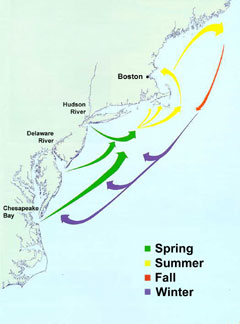
Striped Bass Migration Patterns
Conservation Issues
As fisherman we understand the importance of the environment and the the management of our natural resources.
Origins of the Hudson River Fishermen’s
Association History
Bob Boyle wasn’t the only notable early pioneer of
the HRFA. The following is an excerpt from the SUNY
College of Environmental Science and Forestry
Feinstone Environmental Awards program in 1980.
Arthur Glowka
ARTHUR GLOWKA has used his scientific and
ecological knowledge as a volunteer to muster citizen
support for environmental protection in the Hudson
River and Long Island Sound for nearly 20 years. A
classic activist, he is a founding director of the Hudson
River Fisherman’s Association, and has led that organization
in many projects. Among their accomplishments
are stopping the mass slaughter of striped bass by the
first Indian Point nuclear power plant, and exposing the
cover-up attempts of the fish kills by a utility and a state
agency; resurrecting the Federal Refuse Act of 1899;
stopping the Storm King pumping project on environmental
grounds; forcing the New York National Guard
to restore a Hudson River marsh it was filling for a parking
lot; using for the first time the Freedom of
Information Act to uncover polluters; and bringing the
legal action in the case of PCB pollution in the Hudson
River. Glowka is a recognized citizen expert serving
many organizations, and is president of the Long Island
Sound Taskforce of the Oceanic Society. He has written
many articles and made many public appearances communicating
the importance of volunteering, and created
the “Bag-A-Polluter” campaign that furnishes postpaid
cards for citizens to use in reporting pollution cases.
From Boyle’s Book: (Concerning oil spewing from a
Penn Central pipe in Croton-on-Hudson) “ What can be
done? There are several things. For one, there is public
pressure, and Art Glowka (an Easter Airlines Pilot) has
thought of a very effective way to mount public interest
in stopping pollution. He designed pre-paid “Bag-A-Polluter”
postcards. The card notes the New York Harbor
Act of 1888 and points out that the person who reports a
convicted violator may collect up to $1,250 as a reward.
The cards have a simple entry form where a person can
write the name of the polluter, kind of pollution, time and
date, and any adverse effects noted. The Hudson River
Fishermen’s Association has printed ten thousand Bag-
A-Polluter cards and given them out free up and down
the Hudson Valley…”
The Hudson River a Natural and Unnatural History by
Robert H. Boyle, W.W. Norton Inc. New York 1968. Over
the next few months I will be chronicling the origins and
history of our organization.
Gil Hawkins~~~<^><…
